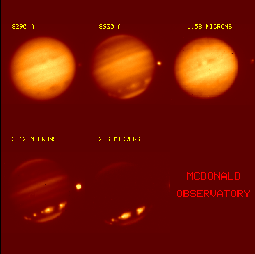

NOTE: Click on the image to view it at its highest resolution.
July 22, 1994
Since our observations of the U and V impacts did not show any flashes or plumes, we present a set of images in five different wavelengths taken at McDonald Observatory on 22 July 1994 UT. In all of these images, north is at the top and west is on the right. The impact sites seen are: E/F, H, the G-D/S-Q1/Q2/R complex, and L going from east to west (left to right).
The images are:
1. The 829nm continuum image showing the five dark impact sites.
2. The methane band image (893nm) showing the same sites as bright spots.
This indicates these features are high in the atmosphere.
3. The continuum image (1.58 microns) showing almost complete lack of
structure at the impact sites. This lack of features could indicate an
intermediate case between absorption in regions of low atmospheric opacity
and reflection/thermal emission in regions of high atmospheric opacity.
4. The molecular hydrogen band filter image (2.12 microns) with the Jupiter
satellite Io moving in toward occultation from the right.
5. A methane band image (2.3 microns) showing complete absorption by the disc
of Jupiter except for the poles and the impact sites.
Image Wavelength Time (UT) Telescope
1 829 nm 03:58 0.8m CCD
2 893 nm 04:00 0.8m CCD
3 1580 nm 03:34 2.7m ROKCAM
4 2122 nm 03:52 2.7m ROKCAM
5 2300 nm 03:25 2.7m ROKCAM
Observers: Dr. Chan Na (Southwest Research Institute), Dr. Wayne Pryor (Univ. Colorado), Dr. Yongha Kim (Univ. Maryland) Dr. Anita Cochran, Dr. Beth Clark, Dr. William Cochran, Dr. Judit Ries, Mr. Anand Kudari (Univ. Texas), and Dr. Edwin Barker (NASA Headquarters)